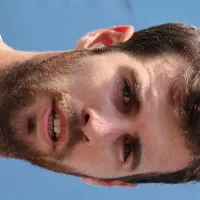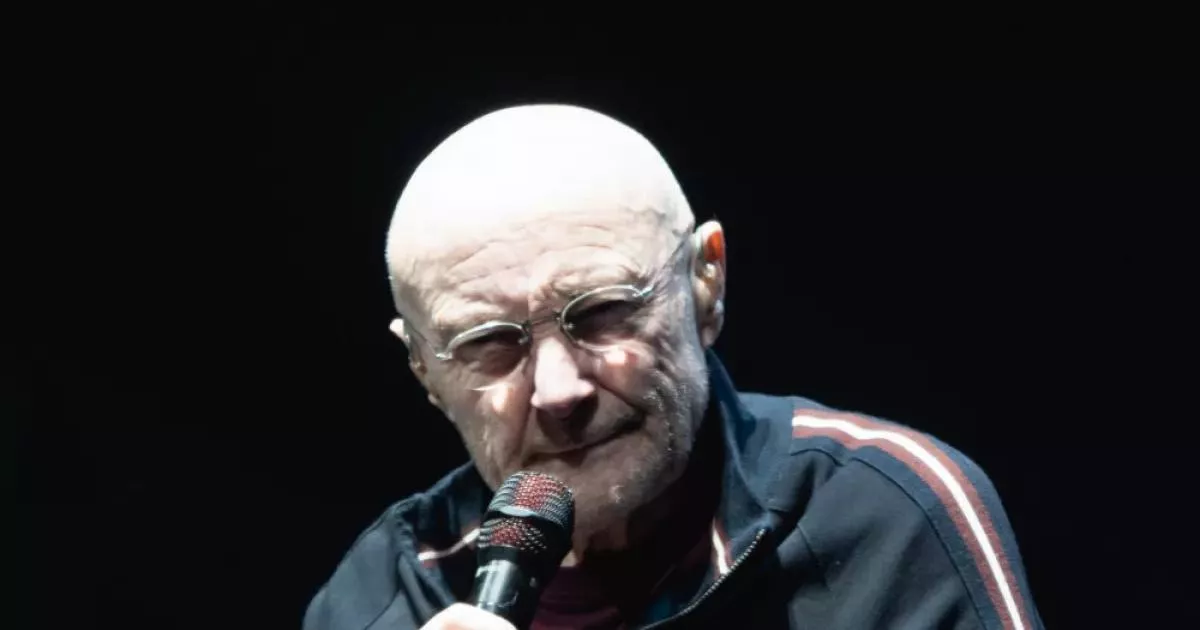Phil Collins is a highly successful English musician, known as the drummer and later lead singer of the rock band Genesis and for his prolific solo career. During the 1980s, Collins achieved more US Top 40 singles than any other artist through his work with Genesis, collaborations, and solo releases. Notable hits include "In the Air Tonight," "Against All Odds," "One More Night," and "Another Day in Paradise," solidifying his status as a pop icon.
1907: Birth of Greville Philip Austin Collins
In 1907, Greville Philip Austin Collins, Phil Collins' father, was born. He worked as an insurance agent.
1913: Birth of Winifred June Strange
In 1913, Winifred June (née Strange), Phil Collins' mother, was born. She worked in a toy shop and later as a booking agent.
January 1951: Philip David Charles Collins' Birth
In January 1951, Philip David Charles Collins was born at Putney Hospital in London.
January 1951: Phil Collins' birth
On January 1951, Philip David Charles Collins, known as Phil Collins, was born in England. He would later become a successful drummer, singer, songwriter, record producer, and actor.
1963: Historical Context of 'Buster'
In 1963, The Great Train Robbery occurred, an event central to the plot of the film Buster in which Collins starred. This real-life event provided the historical backdrop for Collins' acting role.
1964: Extra in the Beatles' film
In 1964, Phil Collins had an uncredited part as an extra in the Beatles' film "A Hard Day's Night."
1967: Starred in Calamity the Cow
In 1967, Phil Collins starred in "Calamity the Cow", a film produced by the Children's Film Foundation. After a falling out with the director, Collins decided to quit acting to pursue music.
1968: Cut scene in Chitty Chitty Bang Bang
In 1968, Phil Collins was to appear in "Chitty Chitty Bang Bang" as one of the children who storm the castle, but his scene was cut.
1968: Jack Wild's role in Oliver!
In 1968, Phil Collins's childhood friend Jack Wild became famous for playing the Artful Dodger in the film Oliver! Collins and Wild both attended the Barbara Speake Stage School.
1969: Release of Tommy
In 1969, The Who released their rock opera Tommy, from which Phil Collins performed "Fiddle About" and "Tommy's Holiday Camp" during his guest appearance with the band in 1989.
1969: Formed Flaming Youth
In 1969, after a European tour with John Walker's backing band, Phil Collins and his bandmates formed a rock band called Hickory, which later became Flaming Youth. They signed to Fontana Records and recorded the concept album "Ark 2".
May 1970: Congas on George Harrison's song
In May 1970, Phil Collins played congas on George Harrison's song "Art of Dying", but his contribution was omitted from the final recording.
July 1970: Audition for Genesis
In July 1970, Phil Collins auditioned for Genesis after seeing an advertisement in Melody Maker.
August 1970: Joined Genesis as drummer
On August 8, 1970, Phil Collins officially joined Genesis as their drummer.
1970: Collins' Songwriting contributions in Genesis
During the period of 1970-75, Phil Collins contributed to the songwriting jams that produced much of Genesis's material, including the staccato rhythm for "Watcher of the Skies".
1970: Collins joined Genesis
From 1970 to 1975, Phil Collins played drums, percussion, and backing vocals on Genesis albums and concerts. He quickly became the primary backing vocalist.
January 1971: Steve Hackett joined Genesis
In January 1971, Steve Hackett joined Genesis.
1972: Birth of step-daughter Joely
In 1972, Andrea Bertorelli gave birth to her daughter Joely, who was later legally adopted by Phil Collins in 1975 after their marriage.
1972: Death of Greville Philip Austin Collins
In 1972, Greville Philip Austin Collins, Phil Collins' father, passed away.
1973: Collaboration with Peter Banks
In 1973, Phil Collins and Steve Hackett collaborated on the solo debut of former Yes guitarist, Peter Banks, marking an early venture outside of Collins' work with Genesis.
1973: Collins' First Lead Vocal
In 1973, Phil Collins sang "More Fool Me" on Genesis' album "Selling England by the Pound" and on the subsequent tour, marking the first time he assumed the role of Genesis lead vocalist in a live setting.
1973: Praise for Drumming on 'Selling England by the Pound'
In 1973, Rush drummer Neil Peart praised Phil Collins' "beautiful drumming" and "lovely sound" on the Genesis album "Selling England by the Pound", calling it "an enduring masterpiece of drumming".
1974: Drums on Brian Eno's album
In 1974, Phil Collins played drums on Brian Eno's second album, "Taking Tiger Mountain (By Strategy)", after Eno had contributed electronic effects to two songs on "The Lamb Lies Down on Broadway".
1974: Reconnected with Andrea Bertorelli
In 1974, Phil Collins reconnected with Andrea Bertorelli when Genesis performed in Vancouver, leading to their marriage in 1975.
1974: Influence on Progressive Rock Drummers
In 1974, according to readers of Rhythm magazine, Phil Collins work on the Genesis album "The Lamb Lies Down on Broadway" was seen as influential to progressive rock drummers.
August 1975: Named lead vocalist of Genesis
In August 1975, Phil Collins became the lead vocalist of Genesis during the recording of their album "A Trick of the Tail".
1975: Collins's role in Genesis
From 1970 to 1975, Phil Collins played drums, percussion, and backing vocals on Genesis albums and concerts. He quickly became the primary backing vocalist.
1975: The 1975 Championed Collins
In 1975 indie rock groups the 1975 championed collins. It is more likely 2010s as that is when they gained popularity and championing an artist is a retrospective action.
1975: Session Work and Album Appearances
In 1975, Collins contributed to several albums, showcasing his versatility. He played drums, vibraphone, and percussion on Steve Hackett's solo album, Voyage of the Acolyte, and also performed on Eno's albums Another Green World, Before and After Science, and Music for Films. Additionally, he joined the jazz fusion group Brand X, replacing their drummer and contributing to their first two albums. He also played percussion on Johnny the Fox by Thin Lizzy, and sang on Anthony Phillips' debut solo album, The Geese & the Ghost.
1975: Marriage to Andrea Bertorelli
In 1975, Phil Collins married Andrea Bertorelli in England after reconnecting in 1974. Both were 24 years old at the time.
1975: Collins becomes lead singer of Genesis
In 1975, Phil Collins took over the role of lead singer for Genesis after Peter Gabriel's departure.
1976: Birth of son Simon Collins
In 1976, Phil Collins and Andrea Bertorelli had a son, Simon Collins, who later became the vocalist and drummer of the progressive rock band Sound of Contact.
1976: Chester Thompson joins Genesis' backing bands
In 1976, Phil Collins brought in American drummer Chester Thompson who became a mainstay of Genesis's and Collins's backing bands until 2010.
1977: Genesis continued as a trio
In 1977, Collins, Banks, and Rutherford decided to continue Genesis as a trio and recorded "...And Then There Were Three...." which included the band's first UK Top 10 and US Top 40 single, "Follow You Follow Me".
December 1978: Hiatus and Marital Issues
In December 1978, Genesis went on hiatus after touring, and Phil Collins traveled to Vancouver, Canada, in an attempt to salvage his marriage. This attempt ultimately failed, leading to his wife returning to England with their children.
1978: Use of Instruments Post-1978
After 1978, Phil Collins's sound, particularly in Genesis and his solo career, included instruments like the Roland TR-808, Roland TR-909, Simmons SDS-V, and LinnDrum drum machines.
1978: Collins moved into Old Croft
In the spring of 1978, Phil Collins and his wife moved into Old Croft, a home in Shalford, Surrey, due to the commercial success of Genesis.
1980: Genesis Resumes Activity with Duke
In 1980, Genesis resumed activity, recording and touring with their album Duke. Each of the three members, including Collins, contributed two tracks to the album. Collins put forward "Please Don't Ask" and "Misunderstanding".
1980: Divorce from Andrea Bertorelli
In 1980, Phil Collins and Andrea Bertorelli divorced, marking the end of their five-year marriage.
1980: Collaboration with Hugh Padgham
In 1980, Phil Collins collaborated with Hugh Padgham on Peter Gabriel's self-titled album, setting the stage for their later work on Collins's debut solo album, Face Value. This collaboration was instrumental in developing the distinct sound of 'Face Value'.
February 1981: Release of 'Face Value'
In February 1981, Phil Collins released his debut solo album, Face Value. The album reached number one in several countries and number seven in the US, with the lead single, "In the Air Tonight", becoming a hit. The album's themes were influenced by Collins's divorce.
September 1981: Solo Performance at Amnesty International Benefit Show and Genesis Album Release
In September 1981, Phil Collins performed as a solo artist at the Amnesty International benefit show, The Secret Policeman's Other Ball, performing "In the Air Tonight" and "The Roof Is Leaking". Also in September 1981, Genesis released the album Abacab.
1981: "In The Air Tonight" Chart Peak
In 1981, "In the Air Tonight" reached No. 6 on the New Zealand RIANZ Singles Chart.
1981: First appearance at Secret Policeman's Ball
In 1981, Phil Collins made his first appearance at the Secret Policeman's Ball in London.
1981: Release of "Face Value" album
In 1981, Phil Collins released his album "Face Value".
1981: Divorce Finalized
In 1981, Phil Collins' divorce was finalized. During this period, while other Genesis members worked on solo albums, Collins rejoined Brand X and also started writing his own demos, marking a period of personal and professional transition.
October 1982: Genesis Reunion Concert
In October 1982, Phil Collins participated in the Genesis reunion concert, Six of the Best, at the Milton Keynes Bowl, which marked the return of Peter Gabriel on lead vocals and Steve Hackett on guitar for this one-off show.
November 1982: Release of 'Hello, I Must Be Going!'
In November 1982, Phil Collins released his second solo album, Hello, I Must Be Going!, which reached number 2 in the UK and number 8 in the US. The album's second single, a cover of "You Can't Hurry Love", became his first UK number one single.
1982: Release of "Hello, I Must Be Going" album
In 1982, Phil Collins released his album "Hello, I Must Be Going".
February 1983: End of 'Hello, I Must Be Going!' Tour
In February 1983, Phil Collins concluded the Hello, I Must Be Going! tour of Europe and North America. Following the tour, Collins played drums on Robert Plant's second solo album, The Principle of Moments, and produced and played on two tracks for Adam Ant's album Strip.
May 1983: Genesis Album Recording
In May 1983, Phil Collins, Tony Banks, and Mike Rutherford recorded a self-titled Genesis album, marking another phase in the band's ongoing work.
February 1984: Release of 'Against All Odds'
In February 1984, Phil Collins released "Against All Odds", the main theme for the romantic film of the same name. This single demonstrated a more pop-oriented sound and reached number one on the Billboard Hot 100 chart, marking a significant achievement in his solo career.
February 1984: End of Genesis Tour and Release of Live Album
In February 1984, the Genesis tour concluded with five shows in Birmingham, England, which were filmed and released as the live album Genesis Live – The Mama Tour, marking the end of a significant touring period for the band.
1984: Collaborations and Charity Work
In 1984, Phil Collins contributed to Philip Bailey's album Chinese Wall, including the duet "Easy Lover", which was successful in both the UK and the US. He also produced and played on tracks for Eric Clapton's Behind the Sun. Additionally, Collins participated in Band Aid, playing drums on "Do They Know It's Christmas?" for Ethiopian famine relief.
1984: Marriage to Jill Tavelman
In 1984, Phil Collins married Jill Tavelman, marking his second marriage.
1984: Played drums on "Do They Know It's Christmas?"
In 1984, Phil Collins played drums on the charity single "Do They Know It's Christmas?".
1984: Recording 'No Jacket Required'
In 1984, Phil Collins recorded his third album, No Jacket Required. This album marked a turning point in his output, shifting from personal lyrics to more upbeat, dance-oriented songs.
1984: Setting of Grand Theft Auto: Vice City Stories
In 1984, which is when "Grand Theft Auto: Vice City Stories" is set, Phil Collins appears in the game, involved in missions where the player must protect him from hitmen.
February 1985: Release of 'No Jacket Required'
In February 1985, Phil Collins released his third album, No Jacket Required, which became a huge worldwide success, reaching number one in several countries and becoming the most successful album of his career.
July 1985: Live Aid Performances
In July 1985, Phil Collins participated in the Live Aid concerts, performing at both Wembley Stadium in London and JFK Stadium in Philadelphia on the same day. He performed his solo material, played drums for Eric Clapton, and drummed with Jimmy Page and Robert Plant for a Led Zeppelin reunion.
October 1985: Reunion for 'Invisible Touch'
In October 1985, Phil Collins reunited with Tony Banks and Mike Rutherford to record Genesis's thirteenth album, Invisible Touch. The reunion and subsequent album marked a significant phase in Genesis's career.
November 1985: Release of "Separate Lives"
In November 1985, Phil Collins released the duet "Separate Lives" with Marilyn Martin for the film White Nights, which became a US number one hit.
1985: Appearance in Miami Vice
In 1985, Phil Collins appeared in an episode of Miami Vice entitled "Phil the Shill," playing a cheating con-man.
1985: Commercial Success and Grammy Wins
In 1985, Phil Collins had three US number one songs, the most by any artist that year. No Jacket Required won three Grammy Awards, including Album of the Year, solidifying his success and impact on the music scene.
1985: Grammy Win and Academy Award Controversy
In 1985, Phil Collins won a Grammy Award for Best Pop Vocal Performance, Male for "Against All Odds". Despite being nominated for an Academy Award for Best Original Song, he was not invited to perform it at the ceremony, leading to controversy.
1985: Performance at both Live Aid concerts
In July 1985, Phil Collins was the only artist to perform at both Live Aid concerts.
March 1986: Collaboration with Howard Jones
In March 1986, Phil Collins contributed to Howard Jones's hit single "No One Is to Blame" by providing drums, backing vocals, and co-production alongside Hugh Padgham, showcasing his versatility and collaborative spirit.
1986: Genesis Puppets in Music Video
In 1986, the creators of the satirical TV show Spitting Image, which caricatured Phil Collins, were commissioned by Genesis to create puppets of the band for their "Land of Confusion" music video.
1987: Grammy Award for Genesis
In 1987, Genesis received a Grammy Award, their only one, and a nomination for the MTV Video Music Award for Video of the Year for "Land of Confusion", highlighting the group's continued success and recognition.
1987: Pop/Mainstream Rock Drummer of the Year
In 1987, Modern Drummer readers voted for Phil Collins as Pop/Mainstream Rock drummer of the year.
1987: Honorary doctorate of fine arts
In 1987, Phil Collins received an honorary doctorate of fine arts at Fairleigh Dickinson University.
1987: Reflection on Past Playing Style
In 1987, Phil Collins reflected on his fast playing in Brand X and early Genesis, admitting that he "actually can't play like that anymore".
1987: Acting Role in 'Buster'
In 1987, after taking a year off from writing and recording, Phil Collins starred in the film Buster, marking his first acting role since the late 1960s. He also contributed to the film's soundtrack.
1988: Starring role in "Buster" film
In 1988, Phil Collins starred in the film "Buster", resuming his acting career.
1988: This Is Your Life Episode
In 1988, Phil Collins was the subject of an episode of the British TV series This Is Your Life, celebrating his career and personal life.
April 1989: Benefit concert for Terry-Thomas
On 9 April 1989, Phil Collins topped the bill at a benefit concert for the veteran English comic actor Terry-Thomas, raising over £75,000.
August 1989: Special Guest with The Who
In August 1989, Phil Collins appeared as a special guest for The Who on their 1989 tour, performing "Fiddle About" as Uncle Ernie and "Tommy's Holiday Camp" from their rock opera Tommy.
October 1989: Release of "Another Day in Paradise"
In October 1989, Phil Collins released "Another Day in Paradise", a song addressing homelessness, which features David Crosby on backing vocals. The song reached No. 1 in the US and became the final number one single of the 1980s in the US.
November 1989: Release of ...But Seriously
In November 1989, Phil Collins released his fourth album, ...But Seriously, which addresses social and political themes. The album achieved worldwide commercial success.
1989: Birth of daughter Lily Collins
In 1989, Phil Collins and Jill Tavelman had a daughter, Lily Collins, who later became an actress.
1989: Madame Tussaud's Rock Circus
In 1989, Phil Collins donated his own clothes to Madame Tussaud's Rock Circus, an exhibition celebrating rock and pop music history, marking his inclusion among major figures recreated in wax.
1989: Drums on Tears for Fears single
In 1989, Phil Collins played drums on the Tears for Fears single, "Woman in Chains".
1989: Release of "...But Seriously" album
In 1989, Phil Collins released the album "...But Seriously".
1989: Involvement in the Who's reunion tour
In 1989, Phil Collins was involved in The Who's reunion tour, which later led to criticism from Roger Waters regarding Collins' ubiquitous presence.
February 1990: Performance and Award at the Brit Awards
In February 1990, Phil Collins performed "Another Day in Paradise" at the 1990 Brit Awards, where it won British Single of the Year.
October 1990: End of Seriously, Live! World Tour
In October 1990, Phil Collins's Seriously, Live! World Tour, which had begun in February 1990, concluded, having covered 121 dates.
1990: Serious, Live! World Tour
In 1990, Phil Collins went on the Seriously, Live! World Tour, during which the live album Serious Hits... Live! was recorded.
1990: ...But Seriously best-selling album in the UK
In 1990, Phil Collins's album ...But Seriously became the best-selling album in the UK.
1990: Roger Waters criticised Collins's ubiquitous nature
In 1990, Roger Waters criticized Phil Collins's "ubiquitous nature", including his involvement in the Who's 1989 reunion tour, expressing his disapproval of Collins's widespread presence in the music industry.
1991: Pop/Mainstream Rock Drummer of the Year
In 1991, Modern Drummer readers voted for Phil Collins as Pop/Mainstream Rock drummer of the year.
1991: Honorary doctorate of music
In 1991, Phil Collins received an honorary doctorate of music at the Berklee College of Music.
1991: Reconvening and Recording of We Can't Dance
In 1991, Phil Collins reunited with Banks and Rutherford to write and record a new Genesis album, We Can't Dance.
1991: "Another Day in Paradise" wins Grammy Award
In 1991, Phil Collins's song "Another Day in Paradise" won the Grammy Award for Record of the Year.
1992: Work on Both Sides album begins
In 1992, Phil Collins began working on his fifth studio album, Both Sides, which marked a departure from his usual style, with him performing all the instruments.
1992: Performance on We Can't Dance tour
In 1992, Phil Collins performed on the Genesis We Can't Dance tour.
1992: Mention in The Sun article
In 1992, Phil Collins was mentioned in The Sun article titled "If Kinnock wins today will the last person to leave Britain please turn out the lights", which stated he was planning to leave Britain in the event of a Labour victory.
1992: Affair with Lavinia Lang
In 1992, while married to Jill Tavelman, Phil Collins had an affair with Lavinia Lang, a former drama school classmate, during a Genesis tour.
November 1993: Release of Both Sides album
In November 1993, Phil Collins released his album Both Sides, which reached No. 1 in eight countries, including the UK.
1993: Genesis wins American Music Award
In 1993, Genesis, featuring Phil Collins, won the American Music Award for Favorite Pop/Rock Band, Duo, or Group.
1993: Starring Role in Frauds and Cameo in And the Band Played On
In 1993, Phil Collins starred in "Frauds", which competed at Cannes, and had a cameo in "And the Band Played On", an AIDS docudrama.
1993: Fax Communication with Jill Tavelman
In 1993, some divorce-related correspondence between Phil Collins and his second wife, Jill Tavelman, was by fax, with a message regarding access to their daughter being reproduced on the front cover of The Sun.
April 1994: Start of the Both Sides of the World Tour
In April 1994, Phil Collins began the Both Sides of the World Tour, which included 165 shows across four legs.
1994: Cevey worked as translator
In 1994, Orianne Cevey worked as Phil Collins's translator at the start of his tour. She was 22 at the time.
1994: Move to Switzerland
In 1994, Phil Collins moved to Switzerland because he started a relationship with a woman who lived there, not for tax reasons.
1994: Filing for divorce from Jill Tavelman
In 1994, Phil Collins openly stated that he had fallen out of love with Jill Tavelman and filed for divorce, initiating the legal proceedings for their separation.
1994: Appointed Lieutenant of the Royal Victorian Order
In 1994, Phil Collins was appointed a Lieutenant of the Royal Victorian Order (LVO) in recognition of his work on behalf of The Prince's Trust.
May 1995: End of the Both Sides of the World Tour
In May 1995, Phil Collins's Both Sides of the World Tour concluded, after 165 shows across four legs since April 1994.
1995: Voice Role in Balto
In 1995, Phil Collins supplied his voice to the animated feature "Balto".
March 1996: Announcement of Departure from Genesis
On March 29, 1996, Phil Collins's decision to leave Genesis to concentrate on his solo career was publicly announced.
July 1996: Phil Collins Big Band Tour
In July 1996, the Phil Collins Big Band toured summer jazz festivals, performing jazz renditions of Genesis and Collins's solo material. Their first date was at the Royal Albert Hall for a Prince's Trust concert with Queen Elizabeth II and Nelson Mandela in attendance.
October 1996: Release of Dance into the Light
In October 1996, Phil Collins released his sixth solo album, Dance into the Light, which reached No. 4 in the UK and No. 23 in the US.
1996: Collins left Genesis to focus on solo work
In 1996, Phil Collins left Genesis to focus on his solo career.
1996: Divorce from Jill Tavelman finalised
In 1996, Phil Collins's divorce from Jill Tavelman was finalised, with Collins paying £17 million as part of the settlement.
1997: Trip into the Light World Tour
In 1997, Phil Collins toured his album Dance into the Light with his Trip into the Light World Tour, covering 82 dates. He also performed at the Music for Montserrat benefit concert in London.
1997: Reports of moving to Switzerland
In 1997, Phil Collins was reported in the British press to have left the UK and moved to Switzerland in protest at the Labour Party's victory in the general election.
1997: Incorrect reports of leaving the country
In 1997, there were incorrect reports that Phil Collins left the country when Labour won the general election.
October 1998: Release of ...Hits compilation album
In October 1998, Phil Collins released his first compilation album ...Hits, which included a new track, a cover of "True Colors" by Cyndi Lauper.
1998: US and European tour of Phil Collins Big Band
In the summer of 1998, Phil Collins Big Band went on a US and European tour. The tour spawned the live album A Hot Night in Paris.
June 1999: Star on the Hollywood Walk of Fame
In June 1999, Phil Collins was awarded a star on the Hollywood Walk of Fame.
June 1999: Release of "You'll Be in My Heart"
In June 1999, Phil Collins's song "You'll Be in My Heart" from Disney's Tarzan was released and spent 19 weeks at No. 1 on the Billboard Adult Contemporary chart.
1999: Marriage to Orianne Cevey
In 1999, Phil Collins married Orianne Cevey, a Swiss national who had worked as his translator at the start of his 1994 tour.
1999: Received star on the Hollywood Walk of Fame
In 1999, Phil Collins received a star on the Hollywood Walk of Fame.
1999: Oscar Win for "You'll Be in My Heart"
In 1999, Phil Collins won an Oscar for "You'll Be in My Heart", defeating "Blame Canada" from South Park: Bigger, Longer & Uncut.
1999: Wrote songs for Disney's Tarzan
In 1999, Phil Collins wrote and performed songs for Disney's animated film "Tarzan", including "Two Worlds", "Son of Man", "Strangers Like Me" and "You'll Be in My Heart".
1999: 'Sussudio' and Prince Comparison
In 1999, Phil Collins's song "Sussudio" was noted to sound similar to Prince's "1999", a comparison Collins did not deny, sparking discussion and commentary on the song's originality and influences.
1999: The Collins Menace
In 1999, journalist Frank DiGiacomo wrote an article titled "The Collins Menace" for New York Observer, commenting on Collins's omnipresence and how difficult it was to escape his music and image.
February 2000: Launch of Little Dreams Foundation
In February 2000, Phil Collins and Orianne Cevey launched the Little Dreams Foundation, a non-profit organization to help children in sports and art.
March 2000: Lawsuit over royalties
In March 2000, Phil Collins launched a case against two former musicians from his band to recoup £500,000 in royalties that were overpaid regarding royalties from Serious Hits... Live! album.
April 2000: High Court ruling on royalties
On 19 April 2000, the High Court in London ruled that two musicians would receive no more royalty money from Phil Collins. The amount that Collins was seeking was halved. This related to five tracks they were involved in, including the hit "Sussudio".
2000: BBC Biography on Negative Criticism
According to a 2000 BBC biography of Phil Collins, "critics sneer at him" and "bad publicity also caused problems", which "damaged his public profile".
2000: Partial deafness
In 2000, Phil Collins became partially deaf in one ear due to a viral infection.
2000: Sudden hearing loss
In 2000, Phil Collins developed sudden hearing loss in his left ear following a recording session in Los Angeles. He consulted doctors who said there was nothing they could do. He later found it was caused by a viral infection.
2000: South Park Episode "Timmy 2000"
In 2000, Phil Collins was portrayed in the South Park episode "Timmy 2000" holding his Oscar, referencing his 1999 win, and the show's creators admitted resenting losing to Collins.
2000: Big Band Drummer of the Year
In 2000, Phil Collins was voted as Big Band drummer of the year by Modern Drummer readers.
2000: Academy Award and Golden Globe Award for "You'll Be in My Heart"
In 2000, Phil Collins won an Academy Award and a Golden Globe Award for Best Original Song for "You'll Be in My Heart" from the movie Tarzan. He also performed at the ceremony and the Disney-themed Super Bowl halftime show.
April 2001: Influence on Mike Portnoy
In the April 2001 issue of Modern Drummer, Dream Theater drummer Mike Portnoy named Phil Collins as one of the drummers he was influenced by and had respect for.
2001: Appearance on Brass Eye
In 2001, Phil Collins appeared in an episode of the controversial British comedy series Brass Eye, endorsing a hoax anti-paedophile campaign. The BBC reported that Collins consulted lawyers regarding the programme.
2001: Urban Renewal tribute album released
In 2001, various hip-hop and contemporary R&B acts, including Lil' Kim, Kelis, and Ol' Dirty Bastard, covered Phil Collins's work on the tribute album Urban Renewal, showcasing his influence in these genres.
June 2002: Performance at the Party at the Palace concert
In June 2002, Phil Collins drummed for the house band at the Party at the Palace concert, celebrating Queen Elizabeth II's Golden Jubilee.
November 2002: Release of Testify
On November 11, 2002, Phil Collins released his seventh solo album, Testify, which was the worst-reviewed album at the time of its release according to Metacritic.
2003: Composition and performance on Brother Bear soundtrack
In 2003, Phil Collins composed and performed on the soundtrack to Disney's animated feature Brother Bear, which included the song "Look Through My Eyes".
2003: Voice Role in The Jungle Book 2
In 2003, Phil Collins supplied voices to Disney's animated film, "The Jungle Book 2".
2003: Inducted into Songwriters Hall of Fame
In 2003, Phil Collins was inducted into the Songwriters Hall of Fame.
June 2004: Start of First Final Farewell Tour
From June 2004 to November 2005, Phil Collins performed his First Final Farewell Tour.
2004: Collins praised as a great vocalist
In 2004, Ben Gibbard of Death Cab For Cutie and The Postal Service described Phil Collins as a "great vocalist", contributing to the growing appreciation of Collins among various artists and musicians.
2004: Collins recognized as an incisive songwriter
In 2004, J. D. Considine wrote in The New Rolling Stone Album Guide that despite his lumpen-pop appeal, Phil Collins is an incisive songwriter and resourceful musician, highlighting his talent beyond his mainstream popularity.
November 2005: End of First Final Farewell Tour
From June 2004 to November 2005, Phil Collins performed his First Final Farewell Tour.
2005: Collins nominates the Gallaghers to be sent into Room 101
In 2005, Phil Collins appeared on the BBC television series Room 101 and nominated the Gallaghers (from Oasis) to be sent into the eponymous room, describing them as "horrible" and criticizing their talent and behavior.
2005: Donation to PETA
In 2005, Phil Collins donated autographed drumsticks in support of PETA's campaign against Kentucky Fried Chicken.
2005: Ranked Fifth Greatest Rock Drummer
In 2005, Planet Rock listeners voted Phil Collins the fifth greatest rock drummer in history, recognizing his contributions to the genre.
2005: Incorrect reports of threatening to return
In 2005, there were incorrect reports that Phil Collins threatened to return if the Conservatives won the election.
2005: Noel Gallagher's comments on Collins's return
Shortly before the 2005 election, Labour supporter Noel Gallagher was quoted saying Phil Collins was threatening to return to live in Britain if the Tories got in.
November 2006: Announcement of Turn It On Again: The Tour
On November 7, 2006, Phil Collins reunited with Banks and Rutherford and announced Turn It On Again: The Tour, nearly 40 years after the band first formed.
2006: Divorce from Orianne Cevey
In 2006, Phil Collins and Orianne Cevey divorced, resulting in Collins paying £25 million to Cevey, which became the largest settlement in a British celebrity divorce.
2006: Appearance in Grand Theft Auto
In 2006, Phil Collins played a fictional version of himself in the video game Grand Theft Auto: Vice City Stories, where the player must save him from Mafia-hired hitmen during a concert performance of "In the Air Tonight".
2006: Work on Tarzan musical production
In 2006, Phil Collins worked with Disney on a musical production of Tarzan.
2007: Genesis Tour and VH1 Rock Honors
In 2007, Genesis, including Phil Collins, toured in Europe and North America, performed at the Live Earth concert in London, and were honored at the VH1 Rock Honors in Las Vegas.
2007: Relationship with Dana Tyler begins
In 2007, Phil Collins began a relationship with American news anchor Dana Tyler.
2007: Rejoined Genesis for Turn It On Again Tour
In 2007, Phil Collins rejoined Genesis for their Turn It On Again Tour.
2007: "In the Air Tonight" Featured in Cadbury Commercial
In 2007, Phil Collins' song "In the Air Tonight" was featured in a popular Gorilla commercial for Cadbury's Dairy Milk chocolate.
2007: Genesis tour
In 2007, Phil Collins's drumming on the Genesis tour caused a problem which required neck surgery in April 2009.
2007: "In The Air Tonight" featured in Aqua Teen Hunger Force
In 2007, the song "In the Air Tonight" by Phil Collins, was featured in the film Aqua Teen Hunger Force Colon Movie Film for Theaters.
2007: "I wish I'd never heard of Phil Collins" Article
In her 2007 article "I wish I'd never heard of Phil Collins", Caroline Sullivan of The Guardian referred to Phil Collins' cumulative negative publicity, finding it difficult to appreciate his work due to her distaste for the man himself.
May 2008: Sixth Ivor Novello Award
On May 22, 2008, Phil Collins received his sixth Ivor Novello Award from the British Academy of Songwriters, Composers and Authors, receiving the International Achievement Award.
July 2008: "In the Air Tonight" Re-enters and Tops New Zealand Chart
In July 2008, following its use in a Cadbury commercial, "In the Air Tonight" re-entered the New Zealand RIANZ Singles Chart at No. 3 and then reached No. 1, surpassing its original 1981 peak.
2008: Criticism in Christian Aid report
In 2008, Phil Collins was one of several wealthy figures living in tax havens who were singled out for criticism in a report by the charity Christian Aid.
April 2009: Neck surgery and loss of feeling in fingers
In April 2009, Phil Collins had surgery on his upper neck to correct a problem that began while drumming on the 2007 Genesis tour. Following the operation, he lost feeling in his fingers.
October 2009: Plans for Motown covers album
In October 2009, it was reported that Phil Collins was planning to record a Motown covers album, aiming to replicate the original songs.
2009: Alan McGee notes a non-ironic revival of Phil Collins
In 2009, Creation Records founder Alan McGee wrote that there was a "non-ironic revival of Phil Collins" happening, noting that younger audiences no longer cared about "indie cred" and simply appreciated a great pop song.
2009: Interview with Mark Lawson
In 2009, Phil Collins said that his father was Conservative but politics never loomed large in his family. He was interviewed by Mark Lawson for the BBC.
2009: Shift in Media Profile
In 2009, journalist Mark Lawson noted that Phil Collins's media profile had shifted from "pop's Mr. Nice guy" to someone accused of "blandness, [being a] tax exile and ending a marriage by sending a fax".
2009: "In The Air Tonight" featured in The Hangover
In 2009, the song "In the Air Tonight" by Phil Collins, was featured in the film The Hangover.
January 2010: Completion of Motown covers album
In January 2010, Chester Thompson announced that Phil Collins's Motown covers album had been completed, with Collins playing drums despite a spinal operation.
March 2010: Induction into the Rock and Roll Hall of Fame
In March 2010, Phil Collins was inducted into the Rock and Roll Hall of Fame as a member of Genesis at a ceremony in New York City.
September 2010: Release of Going Back and promotional performances
In September 2010, Phil Collins released his Motown covers album, Going Back, which reached number one on the UK Albums Chart. He also performed songs from the album in special programmes.
2010: Departure of Chester Thompson
In 1976, Phil Collins brought in American drummer Chester Thompson who became a mainstay of Genesis's and Collins's backing bands until 2010.
2010: Defense of Collins by Gary Mills
In 2010, Gary Mills of The Quietus passionately defended Phil Collins, arguing that the hatred towards him was unjustified and that his career should not be defined solely by perceived missteps like No Jacket Required.
2010: Love Don't Come Easy: Artists We Love to Hate
In 2010, Kevin Courtney of The Irish Times named Phil Collins as one of the ten most disliked pop stars in the world, criticizing his performance at Live Aid and the overall "Phil phatigue" that had set in by the early 1990s.
2010: Collins acknowledges his omnipresence
In 2010, Phil Collins acknowledged that he had been "omnipresent" and that his on-stage persona came out of insecurity, admitting that he found his past self "annoying" when reviewing old VHS tapes.
2010: Feelings of depression and contemplation of suicide
In 2010, Phil Collins alluded to feelings of depression and low self-worth and said he had contemplated suicide but resisted for the sake of his children.
2010: Performance at Royal Albert Hall
In 2010, Phil Collins played at the Prince's Trust event at the Royal Albert Hall.
2010: Inducted into Rock and Roll Hall of Fame as member of Genesis
In 2010, Phil Collins was inducted into the Rock and Roll Hall of Fame as a member of Genesis.
2010: Ranked Among Greatest Drummers
In 2010, Phil Collins was ranked number nine in a list of "The 20 greatest drummers of the last 25 years" by MusicRadar.
January 2011: Weeks in German music charts
As of January 2011, Phil Collins had spent 1,730 weeks in the German music charts, with 766 weeks for Genesis albums and singles and 964 weeks for solo releases.
March 2011: Announcement of time off from career
On March 4, 2011, Phil Collins announced he was taking time off from his career due to health problems and other concerns. On March 7, he confirmed his intention to retire to focus on his family life.
2011: Strong states Collins has undeniable talent
In 2011, Martin C. Strong stated that Phil Collins has had his fair share of mockers and critics over the years, but one thing is sure, and that is his dexterity and undeniable talent, highlighting his musical abilities.
2011: Collins addresses criticism and retirement rumors
In 2011, Phil Collins addressed the criticism he had received, stating that people growing sick of him wasn't his fault and that his statements about retirement had been taken out of context, denying that he was retiring due to bad press.
2011: Death of Winifred June
In 2011, Winifred June (née Strange), Phil Collins' mother, died.
May 2012: Honorary doctorate of history
On 12 May 2012, Phil Collins received an honorary doctorate of history at McMurry University in Abilene, Texas, for his research and collection of Texas Revolution artefacts and documents.
June 2012: Book tour for The Alamo and Beyond: A Collector's Journey
In June 2012, Phil Collins was captured on a book tour for his book The Alamo and Beyond: A Collector's Journey in a short film.
July 2012: ...Hits re-enters US charts
In July 2012, Phil Collins's greatest hits collection ...Hits re-entered the US charts, reaching No. 6 on the Billboard 200.
2012: ...Hits sales in the US
By 2012, Phil Collins's compilation album ...Hits had sold 3.4 million copies in the US.
2012: Appearance at brother's investiture ceremony
In 2012, Phil Collins attended his brother Clive's investiture ceremony at Buckingham Palace, where Clive was awarded an MBE for services to art. Phil shared a memory of their childhood, noting Clive's early artistic talent.
2012: Second-wealthiest drummer
In 2012, Phil Collins was estimated to be the second-wealthiest drummer in the world, surpassed only by Ringo Starr.
2012: Induction into Hall of Fame
In 2012, Phil Collins was inducted into the Hall of Fame.
2012: Inducted into Modern Drummer Hall of Fame
In 2012, Phil Collins was inducted into the Modern Drummer Hall of Fame.
November 2013: Consideration of return to music
In November 2013, Phil Collins told German media that he was considering a return to music and speculated about further live shows with Genesis.
2013: Simpson argues for recognition of Collins's vast influence
In 2013, Dave Simpson of The Guardian argued that it was about time to recognize Phil Collins's vast influence as one of the godfathers of popular culture, despite the fact that few pop figures have become as successful and yet reviled.
2013: Publication on 1980s popular music
In 2013, Dylan Jones mentioned in his publication about 1980s popular music that many of Collins's peers "despised" him, highlighting the negative perception some fellow artists had towards Collins.
2013: Collins Hailed as a Pop Icon
In 2013, Paul Lester of The Guardian wrote that Phil Collins, once considered a joke, was now being hailed as a pop icon, highlighting his influence on US urban music and artists like Kanye West, Alicia Keys, and Beyoncé.
2013: Inducted into Classic Drummer Hall of Fame
In 2013, Phil Collins was inducted into the Classic Drummer Hall of Fame.
2013: Release of short film Phil Collins and the Wild Frontier
In 2013, a short film was released called Phil Collins and the Wild Frontier, which captures Collins on a book tour in June 2012.
January 2014: Collaboration with Adele announced
On January 24, 2014, Phil Collins announced that he was writing new compositions with Adele after being impressed by her voice.
May 2014: Live performance with students
In May 2014, Phil Collins gave a live performance of "In the Air Tonight" and "Land of Confusion" with student musicians at the Miami Country Day School at the request of his sons.
June 2014: Donation of Alamo collection
On 26 June 2014, Phil Collins held a press conference at the Alamo, announcing that he was donating his entire collection to the Alamo via the State of Texas.
August 2014: Acceptance of invitation to benefit concert
In August 2014, Phil Collins was reported to have accepted an invitation to perform at a benefit concert in Miami in December in aid of his Little Dreams Foundation charity, though he ultimately missed the concert due to illness.
September 2014: Collaboration with Adele ends
In September 2014, Phil Collins revealed that the collaboration with Adele had ended, describing it as "a bit of a non-starter".
2014: Portnoy Lauds Collins' Progressive Drumming
In 2014, Mike Portnoy lauded Phil Collins' "amazing progressive drumming" back in the early and mid-1970s.
2014: Inability to play the drums
In 2014, Phil Collins said that he was still unable to play the drums and that it was not arthritis, but an undiagnosed nerve problem.
2014: Gabriel refers to him as 'workaholics' workaholic
In 2014, former Genesis frontman Peter Gabriel referred to Phil Collins as the "workaholics' workaholic", acknowledging his dedication and work ethic within the music industry.
2014: Voted Influential Progressive Rock Drummer
In 2014, readers of Rhythm voted Phil Collins the fourth most influential progressive rock drummer for his work on the 1974 Genesis album The Lamb Lies Down on Broadway.
2014: Diane Birch comments on Collins's music
In 2014, soul singer Diane Birch commented on Phil Collins's music, noting his ability to walk a fine line between cheesiness and sophistication, and praising his awesome production values and rich sound.
2014: Reference in song by Paul Heaton and Jacqui Abbott
In 2014, the Paul Heaton and Jacqui Abbott song "When I Get Back to Blighty", from their album What Have We Become?, made reference to Phil Collins as "a prisoner to his tax returns".
March 2015: Named an honorary Texan
On 11 March 2015, Phil Collins was named an honorary Texan by the state legislature in honor of his donation of his Alamo collection.
May 2015: Signing deal with Warner Music Group
In May 2015, Phil Collins signed a deal with Warner Music Group to have his solo albums remastered and reissued with previously unreleased material.
2015: Named Pioneer of Progressive Rock Drumming
In 2015, MusicRadar named Phil Collins one of the six pioneers of progressive rock drumming, acknowledging his innovative contributions to the genre.
2015: Collins becomes teetotal
In 2015, Phil Collins stated that he had been teetotal for three years, indicating a significant change in his lifestyle and health habits.
2015: Spine operation
In 2015, Phil Collins underwent a spine operation.
October 2016: Publication of Autobiography
In October 2016, Phil Collins's autobiography, "Not Dead Yet", was published, offering insights into his life and career.
2016: Reissue of solo albums
By mid-2016, all eight of Phil Collins's solo albums were reissued with updated artwork, except for Going Back, which received a new cover.
2016: Legal action from Andrea Bertorelli
In 2016, Andrea Bertorelli took legal action against Phil Collins pertaining to his account of their relationship in his autobiography, leading to further complications and disputes regarding their past.
2016: Released memoir
In 2016, Phil Collins released his memoir.
2016: Inability to drum with left hand
In 2016, Phil Collins said he was still unable to drum with his left hand and was advised to practice step by step if he wanted to play again.
2016: Interview in The Guardian
In a 2016 interview in The Guardian, Phil Collins stated that talking about politics to The Sun was one of his biggest regrets and admitted that he didn't vote in the past because he was too busy.
2016: Acknowledged struggle with alcoholism
In his 2016 autobiography, Phil Collins acknowledged that he had struggled with alcoholism following his retirement and third divorce, but had been sober for three years.
January 2017: Diagnosis of Type 2 diabetes and treatment
In January 2017, Phil Collins said he was a type 2 diabetic and had received treatment with a hyperbaric chamber after developing a diabetic abscess on his foot that became infected.
June 2017: Start of the Not Dead Yet Tour
In June 2017, Phil Collins began his "Not Dead Yet Tour" with a short European trek, including five sold-out nights at the Royal Albert Hall.
June 2017: Cancellation of shows due to a fall
In June 2017, Phil Collins cancelled two shows after he slipped in his hotel room and hit his head on a chair, resulting in stitches. The fall was caused by his foot drop, and he subsequently used a cane to walk.
2017: Commencement of Not Dead Yet Tour
From 2017 to 2019, Phil Collins conducted the Not Dead Yet Tour.
2018: Wealth in British music industry
In 2018, Phil Collins was estimated to have a fortune of £120 million, making him one of the 25 wealthiest people in the British music industry.
October 2019: End of the Not Dead Yet Tour
In October 2019, the "Not Dead Yet Tour" concluded after running worldwide for a total of 97 shows, marking the end of a significant period of performances for Phil Collins.
2019: End of the Not Dead Yet Tour
From 2017 to 2019, Phil Collins conducted the Not Dead Yet Tour.
2019: Additional digital releases
In 2019, Phil Collins released additional digital-only albums titled Other Sides and Remixed Sides.
March 2020: Genesis Reformation Announcement
In March 2020, Phil Collins, along with Banks and Rutherford, announced the reformation of Genesis for "The Last Domino? Tour", featuring Collins's son Nic on drums.
October 2020: Cease and desist order to Donald Trump
In October 2020, Phil Collins issued a cease and desist order to Donald Trump and his campaign for playing "In the Air Tonight" at a rally.
2020: Rejoined Genesis for final reunion tour
In 2020, Phil Collins rejoined Genesis for a second and final reunion tour.
2020: Eviction notice against Cevey
In October 2020, Phil Collins filed an eviction notice against Orianne Cevey after she secretly married another man in August, leading to further legal battles and disputes.
September 2021: Start of The Last Domino? Tour
After being rescheduled, "The Last Domino? Tour" by Genesis, featuring Phil Collins, began in September 2021, marking a return to the stage for the band.
2021: Start of Genesis final reunion tour
From 2021 to 2022, Phil Collins was on tour with Genesis for their final reunion tour.
2021: Miami home sold
In 2021, Phil Collins sold his Miami home for $39 million, marking a significant real estate transaction and a potential shift in his living arrangements.
March 2022: Genesis Farewell
In March 2022, at The O2 Arena in London, Phil Collins announced that it was the last show for Genesis, marking the end of their touring career.
2022: End of Genesis final reunion tour
From 2021 to 2022, Phil Collins was on tour with Genesis for their final reunion tour.
August 2024: Home Studio Update
In August 2024, music executive Simon Napier-Bell revealed that Phil Collins was updating his home studio by Lake Geneva, suggesting that new music might be in the works.
December 2024: Release of YouTube documentary
In December 2024, a YouTube documentary titled Phil Collins: Drummer First was released by Drumeo, reflecting primarily on Phil's history as a drummer, in which his ailing health and fragility is observed.
February 2025: No Plans for New Music
In February 2025, Phil Collins stated that he had no current plans to make more music, citing ongoing health issues as a factor.
Mentioned in this timeline

Donald John Trump is an American politician media personality and...

Adele Laurie Blue Adkins is a highly acclaimed English singer-songwriter...

Elizabeth II reigned as Queen of the United Kingdom and...

Kanye West professionally known as Ye is a highly influential...

Steven Spielberg is a highly influential American filmmaker recognized as...

The Billboard Hot is the primary music chart in the...
Trending

16 minutes ago Svitolina advances to face Bencic in Dubai after Badosa retires from match.

1 hour ago Khachanov Advances in Doha, Survives Mochizuki Challenge: Qatar ExxonMobil Open 2026

1 hour ago Stephen A. Smith Criticizes Ben Simmons; Promises More Criticism on First Take.
1 hour ago High Court hears appeal regarding Quran burning conviction; CPS insists it's disorder.

1 hour ago Shadab Khan's bold 'Till Final' claim backfires after Pakistan's defeat against India.

2 hours ago Storm Causes Power Outages Across Central Coast and SLO County, Bringing Down Trees
Popular

Jesse Jackson is an American civil rights activist politician and...
Randall Adam Fine is an American politician a Republican who...

Pam Bondi is an American attorney lobbyist and politician currently...

Barack Obama the th U S President - was the...

Kid Rock born Robert James Ritchie is an American musician...

XXXTentacion born Jahseh Dwayne Ricardo Onfroy was a controversial yet...



